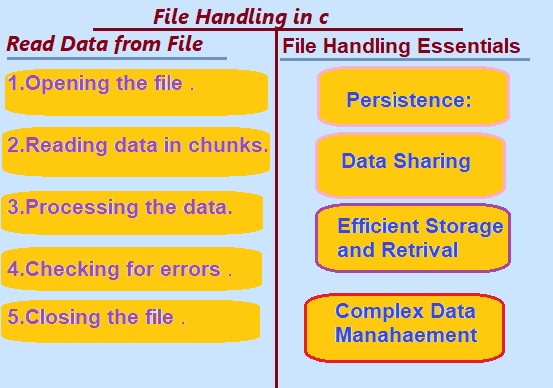Create new files:
In the context of file handling, "creating a file" refers to the process of establishing a new storage location on the computer's storage system.
It can be used to store data generated by programs or provide a way for users to input information. In the context of file management, "file creation" refers to the process of creating a new storage location on a computer's storage system.
It can be used to store data generated by applications or provide a way for users to enter information. Program the new file name and location.
Read data from existing files:
The program can access and process information stored in files. Programs can read and access data from existing files using file handling. This involves:
1. Opening the file using fopen().
2. Reading data in chunks using fscanf()or fread() .
3. Processing the data (disp laying, calculations, etc.).
4. Checking for errors if the file cannot be opened.
5. Closing the file using fclose().
These programs allow you to read contents in files from computers, and allow you to perform the operations for various reasons.
Why file handling is essential in C programming?
Persistence:
Unlike memory variables, which are cleared when the program ends, file data persists after the program ends. This is very important for scenarios where data needs to be saved between program runs, such as user settings, game progress, database logs, etc. Imagine writing a program that generates personalized recommendations for users. Without file processing, recommendations calculated during your session will disappear when you close the program.
Data Sharing:
Files facilitate the exchange of data between programs or users. One program can write data to a file and another program can read and process it, enabling collaboration and information sharing between different applications.
Efficient Storage and Retrieval:
Compared to program memory, files allow for much more storage. This allows programs to process large amounts of data that cannot fit in memory, allowing them to work with large amounts of data without memory limitations.
Complex Data Management:
C programs can interact with files to store and manage large or complex data structures. For example, databases, scientific datasets, or user-generated content can be efficiently stored and retrieved from files.
C programs interact with files to manipulate and store complex data or large data structures. For example, databases, scientific data or user content can be efficiently stored and retrieved from files.
In summary, file management is a basic C programming skill that allows you to maintain data, facilitate data sharing, manage complex data structures, and work efficiently with large data sets. It allows C programs to interact with wider storage systems and manipulate data beyond the scope of the program's execution.
